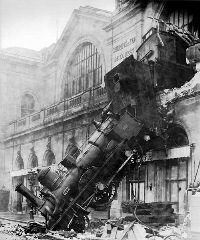The other week I finished up a five part series of posts on Dave Ramsey’s Seven Baby Steps. It seems to have been well received and still gets a steady stream of clicks. But honestly, I was expecting a larger and more  hostile reaction than I got, at least as measured by comments and emails. Ramsey has a very large and devoted following, particularly, it seems, in the blogosphere.
hostile reaction than I got, at least as measured by comments and emails. Ramsey has a very large and devoted following, particularly, it seems, in the blogosphere.
At least I thought so. Maybe I was wrong about that. Perhaps Ramsey is well liked but not, ultimately, taken all that seriously.
Or maybe I was just a little too subtle in what I wrote. Perhaps when I said that “His advice on higher level personal finance topics such as investing and taxes is weak and often misinformed because his knowledge in those areas is limited” my readers thought I was exaggerating for effect. And perhaps when I criticized him for giving advice “on topics such as investing, about which he should probably just keep quiet” those readers didn’t really think I meant that his listeners would be better off if he didn’t cover those topics at all.
Read more »
This is the 100th post to Bad Money Advice. In honor of that milestone I thought I would get a little more philosophical and reflective than usual.
I am generally very suspicious of arguments founded on the assertion that never in history has some aspect of our lives been more difficult or challenging than it is today. Some parts of life in the good old days may have been less  complicated then they are now, but it was a brutal simplicity. I remember years ago when somebody remarked to my grandfather how dirty the streets in New York had become. He rolled his eyes and pointed out that when he was a child those streets where covered in horse manure. And you may think it is stressful to raise kids today, but consider what it was like a few hundred years ago when half of them died before reaching adulthood.
complicated then they are now, but it was a brutal simplicity. I remember years ago when somebody remarked to my grandfather how dirty the streets in New York had become. He rolled his eyes and pointed out that when he was a child those streets where covered in horse manure. And you may think it is stressful to raise kids today, but consider what it was like a few hundred years ago when half of them died before reaching adulthood.
But there is at least one part of our lives that really is much more difficult and harder than it was hundreds of years ago. That is the somewhat amorphous subject that we call personal finance. Don’t get me wrong, I am in no way pining for the old days. In the past there was no such thing as an activity called personal finance for most people because, by our standards, in the past most people spent their lives broke. A person might save food for the coming winter, but not money for retirement. Until recently, there was no such thing as retirement for ordinary folks, and, if you go back far enough, hardly such a thing as money.
Read more »
Normally, I have the criticizing personal financial gurus business all to myself. I like to think this is because I am the only one who sees the faults in their advice, or alternatively, that I am the only one bold enough to say the emperor has no clothes on. But it is also possible I am the only one who takes them seriously enough to bother writing about what they say.
This is not the case with Suze Orman’s recent advice on credit cards and emergency funds. It took a while, but quite a few people thought it was important enough to comment on critically. Welcome to my world.
It started with Orman’s March 1 Suze Scoop. There’s been some disagreement as to what exactly she told her readers to do, so if you are as obsessed about this stuff as I am, click on that link and come back when you are done. In the event that you have more balance in your life, I’ll quote the first two paragraphs.
If you have an unpaid credit card balance and not much saved up in emergency savings I need you to listen up. My advice has changed.
I want you to only pay the minimum due on your credit card balance and instead make it your top priority to build as much of an emergency cash fund as you can.
Read more »
This is the last in my five part discussion of Dave Ramsey’s Seven Baby Steps. (I kicked it off here, and then discussed Step 2, Step 4, and Step 6.) In this post I will tackle Ramsey’s final step, number 7, in which you are instructed to continue to build wealth using equity mutual funds and real estate and to share your bounty with others.
In some ways this is the least substantive of Ramsey’s steps. It is the “and they lived happily ever after” step, as much a carrot to inspire those working their way through the earlier parts of the program as it is a practical set of instructions. But it does provide an excuse to revisit Ramsey’s investment philosophy.
Ramsey is consistent in his aversion to debt. You might call him Shakespearian. “Neither a borrower nor a lender be.” Once you’ve got your debt paid off, invest your savings in growth stock mutual funds and possibly unlevered real estate. Do not lend it to others and do not invest in bonds or bond funds. I think that foolishly limits your investment options, but there is something appealingly old-school about it.
Read more »
Given all the attention generally paid to mortgages, and especially recently, you might think that the basic principles might be widely understood. Alas, no. See, for example, and I cite it only as a typical example, Suze Orman’s 2009 Action Plan, in which she addresses the advisability of borrowing using a  HELOC (Home Equity Line of Credit, essentially a second mortgage on your house) to pay off credit card debt.
HELOC (Home Equity Line of Credit, essentially a second mortgage on your house) to pay off credit card debt.
Do not do this. Even if you have enough equity to keep your HELOC open, this is a dangerous mistake. You are putting your house at risk. When you borrow from your HELOC, your home is the collateral. [page 30.]
That has a strong, almost visceral, intuitive appeal. And as strident as Orman is, she is fairly typical in her warnings against “putting your house at risk.” (See this from the Times a while back.) But it is pretty poor advice for many, probably most, people.
Read more »
 hostile reaction than I got, at least as measured by comments and emails. Ramsey has a very large and devoted following, particularly, it seems, in the blogosphere.
hostile reaction than I got, at least as measured by comments and emails. Ramsey has a very large and devoted following, particularly, it seems, in the blogosphere.


